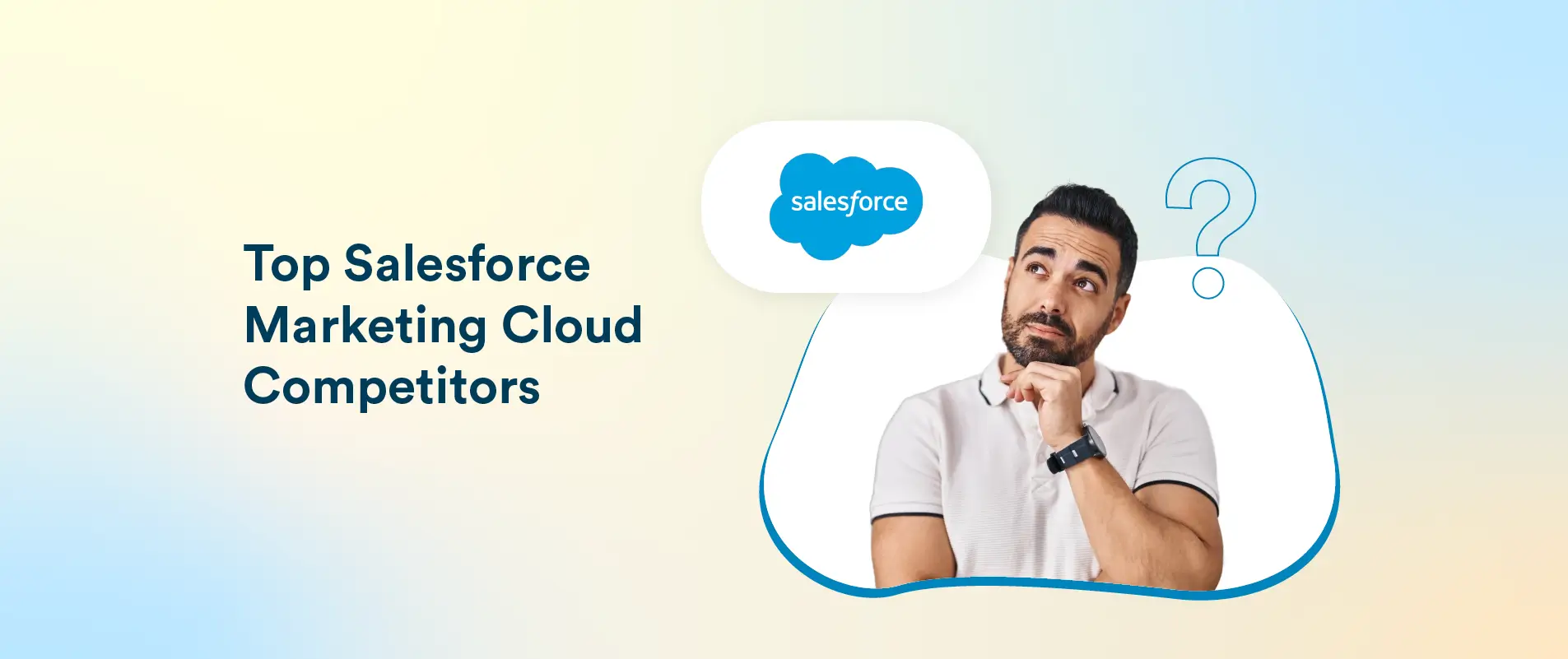Marketing automation has matured from “send a newsletter” tools into customer engagement platforms that orchestrate journeys across email, mobile, web, ads, and service. Salesforce Marketing Cloud (SFMC) is often shortlisted alongside Adobe Marketo Engage, HubSpot Marketing Hub, and Adobe Experience Cloud. This guide gives you a pragmatic, apples-to-apples comparison so you can decide what fits your stack, skills, and scale.
TL;DR (Who tends to pick what?)
- Salesforce Marketing Cloud (Engagement + Data Cloud): Best for enterprises or fast-scaling orgs that need complex, multi-channel journeys, deep personalization on large datasets, and tight alignment with Salesforce CRM/service data.
- Adobe Marketo Engage: B2B demand gen powerhouse—lead nurturing, scoring, and ABM—great when you have complex B2B lifecycle needs and a mixed CRM environment (SFDC, MS Dynamics).
- HubSpot Marketing Hub: All-in-one ease of use for SMBs and mid-market; fast time to value, native CRM, strong content tools.
- Adobe Experience Cloud (Campaign/Customer Journey Analytics/RT-CDP): Enterprise, omnichannel scale with rich web/personalization & analytics—often chosen by teams already invested in Adobe Analytics/Target/Experience Platform.
The Contenders at a Glance
| Capability | Salesforce Marketing Cloud | Marketo Engage | HubSpot Marketing Hub | Adobe Experience Cloud (Campaign + AEP) |
|---|---|---|---|---|
| Core Strength | Complex, real-time journeys; enterprise data; multi-cloud Salesforce synergy | B2B lifecycle, lead scoring, ABM, nurture | Ease of use, content + CRM in one, quick deployment | Enterprise omnichannel at scale, deep analytics & personalization |
| Data Foundation | Data Cloud (CDP), contact & event models, real-time unification | Lead/contact database with custom fields & smart lists | Native CRM objects + lists, simple segmentation | AEP RT-CDP + Profiles + event streaming |
| Journeys/Automation | Journey Builder, real-time triggers, Mobile/Email/Ads | Smart campaigns, nurture streams | Workflows, simple journey builder | Adobe Journey Optimizer, rule-based & event-driven |
| Personalization | Einstein AI, AMPscript/SSJS, Content Builder rules | Tokens, dynamic content, predictive scores | Smart content, AI assistants, basic rules | Adobe Target, AI/ML (Sensei), rich web personalization |
| Channels | Email, SMS, Push, In-app, WhatsApp, Ads, Web | Email, Webhooks, Ads (via integrations) | Email, Ads, basic SMS (add-ons), Chat | Email, SMS, Push, Web, Ads, Connected TV (via partners) |
| Analytics | Datorama (MC Intelligence), Journey analytics, AI insights | Program performance, attribution, RCE (add-on) | Built-in dashboards, attribution, rev reporting | Customer Journey Analytics with Adobe Analytics |
| Extensibility | APIs, packaged connectors, AppExchange, SSJS | REST APIs, LaunchPoint ecosystem | APIs, marketplace, custom objects (Enterprise+) | Extensive APIs, Adobe/partner ecosystem |
| Typical Buyer | Enterprise B2C/B2B2C & complex B2B | B2B mid-market/enterprise | SMB–mid-market | Enterprise consumer brands with heavy web/digital |
Note: Pricing varies by contacts, channels, add-ons (CDP, analytics), and SLAs. Always model total cost of ownership (TCO) over 3 years.
Deep Dive: Where SFMC Stands Out
1) Journey Orchestration at Scale
- Journey Builder supports branching, event and API-triggered paths, and channel switching (email → push → SMS) based on behaviors.
- Real-time decisioning with Entry/Exit criteria, goal tracking, and Einstein predictions (e.g., send-time optimization).
2) Data Depth & Identity
- Data Cloud (Salesforce CDP) unifies data from CRM, web, mobile, POS, and data lakes into person & household profiles with consent states.
- Strong identity resolution, calculated insights, and segment activation across Salesforce clouds and ad networks.
3) Salesforce Ecosystem Synergy
- Tight integration with Sales Cloud, Service Cloud, Commerce, and Tableau improves lead handoff, service-triggered campaigns, and revenue analytics.
- AppExchange offers packaged connectors (loyalty, events, offline data ingestion, WhatsApp, etc.).
4) Multi-Channel Breadth
- Native Email, SMS, Push, In-App, WhatsApp, and Advertising audiences, with robust template and content tooling.
5) Governance & Global Scale
- Business units, partitioned data, granular roles/permissions, and approval flows suit complex orgs and agencies.
Where SFMC May Be Overkill (or Need Expertise)
- Operational Complexity: Advanced features (AMPscript, SSJS, Data Views, SQL) may require specialized admin/dev skills.
- TCO Considerations: Enterprise license + add-ons (Data Cloud, Intelligence) add cost; ROI is realized when you use multiple channels and rich data.
- B2B Lead Ops: It can do B2B very well, but Marketo still wins hearts for classic demand-gen pipelines and ABM simplicity—unless you pair SFMC with Salesforce Account Engagement (formerly Pardot) and Data Cloud.
Competitor Strengths (Fair Credit Where Due)
Marketo Engage
- Lead Lifecycle & Scoring: Mature nurture programs, program-level analytics, and revenue cycle modeling.
- ABM: Native account lists, intent enrichment (via partners), and sales alerts.
- CRM Flexibility: Works well with Salesforce and Microsoft Dynamics.
HubSpot Marketing Hub
- Time to Value: Onboarding is fast; marketers can build without heavy admin overhead.
- Content & SEO: Blog, CMS, forms, and chat tightly integrated; great for inbound.
- Unified UI: Fewer tools to stitch—ideal for lean teams.
Adobe Experience Cloud
- Web-Centric Personalization: Best-in-class when combined with Adobe Analytics and Adobe Target.
- Enterprise Data: The AEP RT-CDP + Journey Optimizer stack supports sophisticated, real-time omnichannel.
- Creative/Content Ecosystem: Natural fit for creative-heavy orgs already on Adobe.
Feature-by-Feature Comparison
Data & CDP
- SFMC: Data Cloud offers identity stitching, profile unification, consent management, calculated insights, and activation to SF clouds and ad destinations.
- Marketo: List-based segmentation with custom fields; CDP-like use cases often require additional tools.
- HubSpot: Simple, effective CRM objects + lists; custom objects in higher tiers; CDP-light for many SMB needs.
- Adobe: AEP is a true enterprise CDP with event streaming and powerful schemas.
Journey Design & Triggers
- SFMC: Visual Journey Builder supports multi-step, event/API triggers, and channel pivoting.
- Marketo: Smart campaigns excel at B2B nurture; fewer native mobile channels.
- HubSpot: Intuitive workflows; good for email/web; limited deep branching at enterprise complexity.
- Adobe: Journey Optimizer handles complex omnichannel with web personalization superpowers.
Personalization & AI
- SFMC: Einstein (send-time, engagement scoring, content selection); AMPscript/SSJS for deep dynamic content.
- Marketo: Predictive lead scoring, dynamic content, tokens.
- HubSpot: AI assistants for content, basic predictive tools, smart content.
- Adobe: AI (Sensei) across Target, AEP for next-best-offer in web/app contexts.
Channels
- SFMC: Strongest native mobile + messaging mix (SMS, Push, In-App, WhatsApp) plus Ads.
- Marketo: Email-first; relies on integrations for mobile/app messaging.
- HubSpot: Email + Ads; SMS via add-ons; great blog/CMS/landing pages.
- Adobe: Email, SMS, push, and rich web/app personalization through Adobe stack.
Reporting & Attribution
- SFMC: Marketing Cloud Intelligence (Datorama) for multi-touch dashboards and cross-channel ROI; Journey analytics.
- Marketo: Program performance, revenue cycle analytics (add-on), decent MQL/SQL reporting.
- HubSpot: Clean out-of-the-box dashboards; solid for SMB and mid-market attribution.
- Adobe: Customer Journey Analytics with Adobe Analytics—very powerful for web-heavy orgs.
Ecosystem & Extensibility
- SFMC: AppExchange, APIs, packaged connectors; strong when paired with Sales/Service/Commerce.
- Marketo: LaunchPoint marketplace; strong partner ecosystem for B2B add-ons.
- HubSpot: Marketplace + native CMS; developer-friendly for SMB needs.
- Adobe: Broad Adobe/ISV ecosystem; sophisticated but complex.
Implementation Considerations & Hidden Gotchas
- Data Readiness
- If your customer data lives across CRM, ecommerce, apps, and data lakes, SFMC + Data Cloud or Adobe AEP will handle unification best.
- If most of your GTM runs out of Salesforce CRM and you need sales-marketing alignment, SFMC is a natural fit.
- Team Skills & Resourcing
- SFMC delivers top-tier capability but rewards teams with admin/dev capacity (SQL, scripting, APIs).
- HubSpot is best for lean teams prioritizing speed and simplicity.
- Compliance & Consent
- Global brands should evaluate consent models (email/SMS/WhatsApp), regional data residency, and audit trails. SFMC, Adobe, and Marketo all support enterprise governance; HubSpot covers common needs well.
- Total Cost of Ownership (TCO)
- License + add-ons (CDP, analytics, messaging) + services + integration cost.
- Model 3-year TCO vs. expected revenue lift from journey automation, churn reduction, and media efficiency.
Decision Guide (Quick Scenarios)
- We’re a D2C brand with app + web, heavy lifecycle messaging.
Choose Salesforce Marketing Cloud (add Data Cloud for 360° profiles). Strong mobile, WhatsApp, and behavioral triggers. - We’re a B2B SaaS with sophisticated lead ops and ABM.
Choose Marketo Engage (or SFMC + Account Engagement if you want unified Salesforce stack). - We need fast setup, content-first inbound, and simple automation.
Choose HubSpot Marketing Hub. - We’re an enterprise with deep web analytics, personalization, and large content ops.
Choose Adobe Experience Cloud (Campaign + AEP + Target/Analytics).
Migration & Integration Tips
- Start with Data Contracts: Define golden customer profile, consent flags, and event taxonomy before any build.
- Phase Journeys: Recreate top 3 revenue-impact journeys first (onboarding, abandonment, win-back), then expand.
- Parallel Run & QA: Keep legacy automation live while validating segments, deliverability, and KPIs.
- Measure Early: Establish pre-migration baselines (open/click, conversion, LTV, CAC) to prove ROI within 90 days.
KPI Framework to Compare Platforms
- Engagement: Delivered rate, opens/clicks, app opt-in, send-time optimization lift.
- Journey Performance: Conversion per step, time-to-convert, drop-off heatmaps.
- Revenue & Efficiency: Incremental revenue per message, MTA/MTA-like lift, media spend efficiency via audience suppression.
- Data Quality: Match rate across sources, identity resolution accuracy, consent coverage.
- Ops: Build time per campaign, error/rollback rate, dependency on dev resources.
Frequently Asked Questions
Is SFMC only for enterprises?
No, but it shines with scale and complexity. Smaller teams can use it successfully when journeys span multiple channels and data sources.
Do I need Data Cloud with SFMC?
Not always. If you’re unifying lots of disparate data (apps, web, POS, service), Data Cloud adds big value.
Can I run B2B on SFMC?
Yes—especially paired with Salesforce Account Engagement for lead lifecycle and with Sales Cloud for revenue attribution.
Which platform is “best”?
The “best” platform matches your data reality, team skills, channels, and growth goals—not just feature checklists.
Bottom Line
- Choose Salesforce Marketing Cloud when omnichannel journeys, enterprise governance, and Salesforce ecosystem alignment are strategic.
- Choose Marketo Engage when B2B lead lifecycle, scoring, and ABM are core.
- Choose HubSpot when time-to-value and marketer-friendly UX matter more than deep customization.
- Choose Adobe Experience Cloud when web/app personalization at enterprise scale is mission-critical.
If you’d like, share your current stack, primary channels, team size, and top 3 journey goals—I can map this to a precise recommendation and a phased rollout plan.




